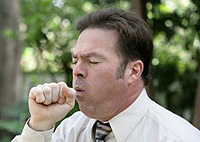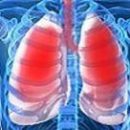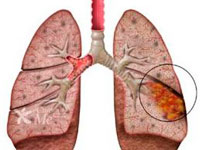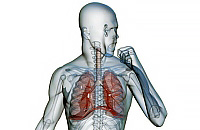What is chronic obstructive bronchitis? What are the symptoms and the treatment of this disease? How smoking affects the disease? Answers to these questions you will find in the article.
Content
Chronic obstructive bronchitis
Chronic obstructive pulmonary disease (COPD) - the new name of a very old disease, chronic obstructive bronchitis.
Continuous poisoning of lungs smoke cigarettes, industrial emissions,
Exhaust of cars, asphalt evaporation, etc. lead to
long-term inflammation of the bronchi (bronchitis), to the loss of elasticity
Light fabric (pneumosclerosis), partial destruction and blooming fabric
Lights (emphysema). Eight million Russians are subject to this
Disease.
Hurried chronic obstructive pulmonary disease and ultimately
Died from her, the great proletarian writer Maxim Gorky, big
Russian actor Oleg Efremov and Secretary General of the Central Committee of the CPSU Konstantin
Ustinovich Chernenko. True, another 10 years ago there was no such disease -
Diagnosis of chronic pneumonia, lung emphysema or chronic
obstructive bronchitis. The only thing that ringed these completely different
people - painful passion for smoking.

Tobacocuria is one of the most insidious risk factors in
Development of the disease, as a considerable period of time passes, sometimes
more than ten - fifteen years before the clinical manifestations of chronic obstructive bronchitis will give the basis of the sick person to realize the pathogen
Tobacco.
Scientific
Studies held in recent years especially actively allowed
establish the fact that under the index of a smoking person exceeding the number
120, the symptoms of chronic obstructive lung bronchitis will necessarily appear.
Calculation
The index of the smoking person is carried out as follows. Quantity
Cigarettes smoked during the day multiplied by the number of months in
year during which man smokes. If the result exceeds 120, then
It is necessary to consider the symptoms - cough, the destruction of sputum, shortness of breath,
as manifestations of bronchitis smoking man.
Consider a specific example:
Man smokes on day a pack (20) cigarettes and smokes all year round, his
Index will be 20 x 12 = 240. This is a high indicator that
allows the doctor to consider his patient as «maligning»
Smokers.
It is also necessary to take into account the factor of passive smoking.
Numerous studies found that passive smoking
should be considered as a risk factor in the occurrence
significant group of letters. Children are especially sensitive to
Toxic and allergenic effects of tobacco smoke components.
In families in which adults are smoking, children
susceptible to respiratory diseases, acute infectious
Diseases they acquire a protracted character, such children are significantly
more often sick bronchial asthma.
Symptoms and treatment of chronic obstructive bronchitis
The main clinical manifestations of chronic obstructive lung bronchitis are symptoms,
Characteristic for chronic bronchitis: cough, increased products
Bronchial Secretary and his branch of the respiratory tract with cough,
dyspnea. As a result, gas exchange is broken, lungs cease to cope
with the provision of an organism with oxygen, and the most serious and
The most painful symptom of the disease - shortness of breath.
Than chronic bronchitis differs from chronic obstructive bronchitis?
The difference is the nature of violations of the ventilation function of the lungs.
Chronic obstructive bronchitis is characterized by the fact that the cough and
Wet selection joins shortness of breath. Dyspnea is a cardinal sign
Patients.
Treat such patients extremely difficult. Treatment does not give a momentum
effect, efforts are required by the patient. The most important -
It is necessary to stop smoking, and this seems impossible for many,
causes irritation. But modern drugs with the desire of the patient
follow the recommendations of the doctor allow to significantly improve it
condition. First of all, these are anti-inflammatory inhalation and
Bronchievous drugs. Physical workout play a big role
and implementation of measures to prevent exacerbations.









